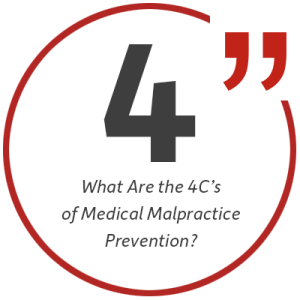Medical malpractice falls under the umbrella of personal injury cases. We go to doctors and medical professionals for quality care and to receive the correct diagnoses for our health concerns, but unfortunately, it doesn’t always work out that way. It is possible that these medical professionals can make mistakes and cause further injury to their patients, it may result in a medical misdiagnosis, which in turn can lead to a misdiagnosis lawsuit.
You deserve to be correctly diagnosed so that you can seek appropriate medical care right away.
Scholars and legal professionals define Medical Malpractice as “any act or omission by a physician during treatment of a patient that deviates from accepted norms of practice in the medical community and causes an injury to the patient.” Specifically, medical malpractice is a subcategory of tort law that is used to address medical negligence by a healthcare provider.

Because medical negligence is such a serious problem, the law has developed rules and procedures to prove liability when a patient is injured by a trusted medical professional. When medical malpractice occurs, it can be absolutely life-changing.
This raises the question: is it considered malpractice if a doctor has misdiagnosed your illness? What if instead of a completely missed diagnosis, the doctor failed to diagnose your condition in time to receive necessary treatment?
Furthermore, can you pursue a misdiagnosis lawsuit if you were misdiagnosed? In this article, we discuss common types of malpractice and whether or not you will have a case to pursue if your doctor misdiagnosed you.
An experienced medical malpractice lawyer like the attorneys at Crossen Law Firm can answer your questions and help you recover from a damaging case of medical malpractice. You deserve to have an advocate who can make sure that the provider who injured you through a misdiagnosis is held accountable.
What Are the 4 Cs of Medical Malpractice Prevention?
To determine if your circumstances meet the minimum requirements for a medical malpractice lawsuit, you can check to see if your provider violated the 4 Cs of medical malpractice prevention.

- Compassion: Healthcare providers must be compassionate toward their patients and sympathetic toward their needs.
- Communication: Medical professionals should communicate with their patients. This includes listening to the patient and answering their questions.
- Competence: A competent doctor will continually update their skills and seek outside guidance when a case exceeds their skills and knowledge. Any reasonably competent doctor will always double-check their work for any mistakes.
- Charting: Medical malpractice lawsuits are dependent upon charting. Excellent charting will help healthcare professionals avoid making an incorrect diagnosis or other diagnostic errors.
If a provider were to always follow these 4 Cs, they would be very unlikely to face a medical malpractice case. Unfortunately, doctors and other healthcare providers fail to uphold these conditions every day.
What Exactly Is a Misdiagnosis?
A misdiagnosis of your injury or sickness means your doctor either incorrectly guessed or read your test results wrong. If a doctor fails to give you the correct diagnosis, you may face some serious health consequences. Failure to diagnose a condition isn’t just a harmless mistake a doctor makes.
In many circumstances, a misdiagnosis can cause one or more of the following:
- Worsened medical condition
- Delayed diagnosis (for example, if you presented with wheezing and were diagnosed with asthma, but you actually had cancer, that delayed lung cancer diagnosis could cause you to fail to receive the appropriate medical care in time for the most successful treatment)
- Expensive treatments that weren’t necessary
- Further injury or death
Diagnostic errors can increase your medical expenses, lead to unnecessary treatments, and even result in a patient’s death.
It’s true that not all misdiagnoses are harmful.
If your medical misdiagnosis was minor and did not cause you harm, you likely do not have grounds for a malpractice suit. However, if a doctor was negligent and you suffered harm, it is important to bring a misdiagnosis lawsuit and hold the person who made the medical mistake accountable.
Consider the severity of a delayed cancer diagnosis, for example. When cancer goes undiagnosed, it can grow and metastasize into other cells, making treatment longer, more difficult, and less likely to be successful.
Common Misdiagnoses
Most of the time, doctors are successful in diagnosing their patients properly, but mistakes do happen, which may cause a patient’s condition to worsen or undergo unnecessary medical treatment. When a doctor diagnoses someone incorrectly, the mistake can lead to really significant effects.
Some of the most common misdiagnoses include:
- Asthma – misdiagnosed as recurring bronchitis
- Heart attack – misdiagnosed as indigestion or a panic attack
- Lyme disease – misdiagnosed as the flu or mononucleosis
- Parkinson’s – misdiagnosed as Alzheimer’s, stroke, or stress
- Lupus – misdiagnosed as chronic fatigue syndrome, fibromyalgia, or rheumatoid arthritis
- Cervical cancer – misdiagnosed as UTIs or uterine fibroids
- Lung cancer – misdiagnosed as asthma, allergies, pneumonia, Covid-19, or other respiratory illnesses
- Colon cancer – misdiagnosed as IBS, diverticulitis, or colitis
If you were misdiagnosed because a doctor was negligent, you may be able to file a malpractice lawsuit. The question, though, is whether the failure to provide a correct diagnosis is actually grounds for a medical malpractice case. Medical negligence is about more than just making a harmless mistake.
When Is a Misdiagnosis Lawsuit Considered Medical Malpractice?
To win a misdiagnosis lawsuit, you must prove that the medical provider was negligent.
To prove negligence, you must prove that each of the following things is true:
Duty of Care

You must be able to prove that you and the doctor who misdiagnosed you had an established doctor-patient relationship. The doctor’s misdiagnosis must have been part of a formal medical visit and not from anyone else merely speculating what your illness may be. This can include regular check-ups, acute care appointments, screening exams, or a visit to the emergency room, among others.
Breach
Once a doctor-patient relationship has been proven, you will need to prove that the doctor breached their duty of care by failing to take the necessary steps to provide an accurate diagnosis. If a doctor owed you a duty of care and breached it, then a malpractice lawsuit may be looming.
Injury
This is where you must prove your injury was suffered due to the misdiagnosis of your doctor. This may mean that you need to prove your ailment did not improve after the doctor’s visit or that it even worsened. If the doctor’s actions caused you no harm, then you are disqualified from taking legal action.
Cause
Your injury must be directly caused by the doctor’s failure to successfully diagnose you. The patient’s medical condition has to be worsened because of the doctor’s error. You cannot sue a doctor for failing to notice other ailments that are not related to what you were seeking treatment for.
Common Defenses Against a Misdiagnosis Lawsuit
When a patient files a lawsuit alleging a doctor’s misdiagnosis caused them harm, the accused providers will mount a vigorous defense. Some of the most common arguments they make include:
Questioning whether a duty of care existed
The defense may claim no formal doctor-patient relationship was established, so the medical professional did not owe the patient a duty of care. This could be argued if the alleged misdiagnosis occurred in an informal setting.
Disputing whether the standard of care was breached
The defense will contend reasonable care was provided, and the doctor’s diagnostic process met the accepted medical standard. Expert testimony is generally used to establish the prevailing standard of care.
Arguing causation is lacking
Even if a breach of duty is proven, the defense will claim the patient’s condition was not directly caused by the misdiagnosis, but rather by an underlying illness or natural progression of disease.
Asserting the patient shares some of the fault
Defendants may allege the patient provided inaccurate medical history or failed to disclose pertinent symptoms, misleading the doctor and contributing to the diagnostic error.
Claiming the Statute of Limitations has expired
Doctors will argue too much time has passed between the misdiagnosis and the filing of the malpractice lawsuit. They may argue that you are ineligible for financial compensation if you waited too long. Most states impose a 1-3 year limit. In Indiana, the statute of limitations is 2 years from the point that the wrong diagnosis was made. A medical malpractice attorney can help you determine if your case may meet special considerations, such as a misdiagnosis case that occurred when the patient was a child or when a misdiagnosis occurred years before the patient was correctly diagnosed.
How to Overcome These Objections in a Misdiagnosis Lawsuit
To overcome these defenses, patients must present convincing evidence proving duty, breach, causation, timely claim filing, and reasonable conduct on their part. Skilled medical malpractice attorneys know how to strategically defeat common defense arguments. Thorough investigation and preparation are key to proving negligence and prevailing in a misdiagnosis dispute.
What Can You Do To Avoid a Misdiagnosis Lawsuit?
We typically trust doctors to do their job successfully, but mistakes happen to everyone, including doctors and other care providers.
To reduce your chances of being misdiagnosed and suffering through unnecessary treatment, we recommend that you do the following:
- Ask questions if you are not improving
- Ask for a second opinion
- Write down anything you do not understand like notes, directions, or medical terms
- Ask for other possible diagnoses so you can switch treatment if you need to
- Ask for recommendations on other doctors
- Make an appointment with a specialist
- Remember that you have a right to request your medical records
How to Prepare for a Medical Misdiagnosis Lawsuit
After a wrong diagnosis, you may be facing extensive medical bills, life-threatening complications, long-term disability, pain and suffering, and even an increased risk of death. A wrong diagnosis — or even a delayed diagnosis — can wreak havoc on your health and well-being. It can be intimidating to think about whether or not you want to sue a doctor, but an experienced lawyer from a compassionate law firm can help you prepare.

To prepare for your medical malpractice lawsuit, document all of your monetary and non-monetary losses related to the incorrect diagnosis.
Monetary Losses
Failing to receive the correct diagnosis may cause several financial losses, including:
- Medical bills for the correct diagnosis when it finally occurs
- Expenses for treatments the doctor prescribed that were unnecessary
- Cost of ongoing medical care
- Emergency room visits
- Rehabilitation costs
- Lost wages from missed work
- Lost earning capacity if you have to stop working long-term or permanently
Non-Monetary Damages
When a doctor diagnoses you incorrectly, you may deal with more than just financial damages. Depending on the specifics of the doctor’s failure to correctly diagnose you, you may also deal with things such as:
- Pain and suffering
- Scarring and disfigurement
- Loss of enjoyment of life
- Loss of consortium
Why Should I Hire A Lawyer?
Medical malpractice cases are tough to navigate alone, and it can be awkward to sue a doctor you have known for a long time if they were negligent and caused you harm. Don’t go at it alone, let us help you so you can focus on recovery.
Personal injury lawsuits make sure that negligent parties are held accountable for their actions. A care provider has a responsibility to their patients to correctly diagnose medical conditions. When you need to prove misdiagnosis was the result of a failure to provide the right medical care, your best bet is to work with a personal injury lawyer.
Schedule a Free Case Review with Crossen Law Firm
If you or a family member are suffering from an injury and need help determining whether or not you have a malpractice case, Crossen Law Firm is here for you. Our Indianapolis personal injury lawyers are equipped with the knowledge and resources to help you with your claim and advocate for your best interest.
To schedule a free consultation with our reliable team, dial (317) 401-8626 today. Or contact us online.

 317-401-8626
317-401-8626 
.jpg)